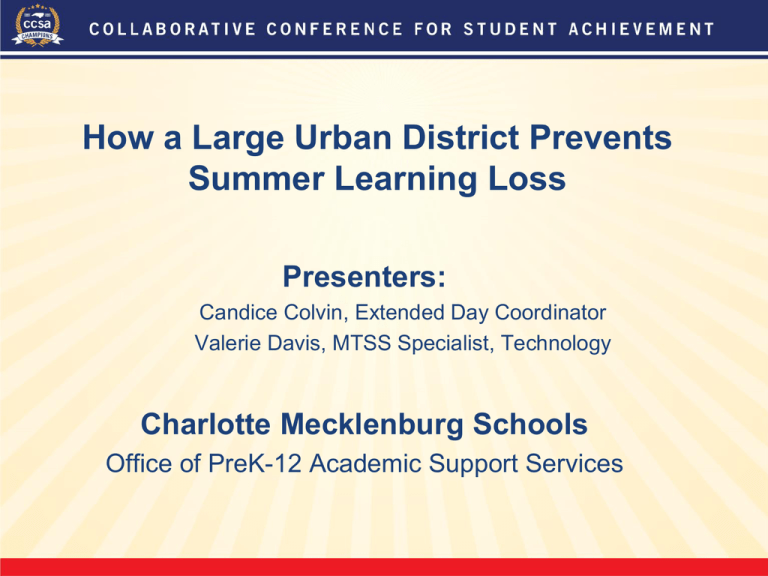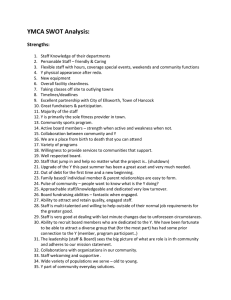How a Large Urban District Prevents Summer Learning Loss Presenters: Charlotte Mecklenburg Schools
advertisement

How a Large Urban District Prevents Summer Learning Loss Presenters: Candice Colvin, Extended Day Coordinator Valerie Davis, MTSS Specialist, Technology Charlotte Mecklenburg Schools Office of PreK-12 Academic Support Services Why Does Summer Matter? Summer Matters because high quality summer learning is essential to preventing “summer learning loss” and encourages students to be lifelong learners, rather than solely classroom learners. Reference: summermatters2you.net Why Does Summer Matter? High quality summer learning programs change students’ lives for the better each and every summer, improving students’ academic achievement and readiness to learn. Reference: summermatters2you.net Reference: summerlearning.org How a Large Urban District Prevents Summer Learning Loss Session Objectives 1. By the end of the session, participants will be able to identify key components of a successful summer learning program designed to prevent summer learning loss. 2. By the end of the session, participants will be able to determine resources, key staff and stakeholders, that contribute to the development of a summer learning program in their district. 3. By the end of the session, participants will be able to provide direction and guidelines for instructional structure, intent/purpose, and outcomes for summer learning programs K-12. How a Large Urban District Prevents Summer Learning Loss Charlotte Mecklenburg Schools Charlotte-Mecklenburg Schools (CMS) is located in the Charlotte, North Carolina region and provides academic instruction, rigor and support each school day to more than 144,000 students in kindergarten through 12th grade in 164 schools throughout the cities and towns of Mecklenburg County. CMS is one of the largest employers in Mecklenburg County with more than 18,000 teachers, support staff and administrators. CMS is proud of its diverse mix of students who represent 160 different countries and various cultural and ethnic backgrounds. How a Large Urban District Prevents Summer Learning Loss Charlotte Mecklenburg Schools Student Ethnicity Distribution • • • • • American Indian/multiracial 3% Asian 5% African American 42% Hispanic 18% White 32% How a Large Urban District Prevents Summer Learning Loss Charlotte Mecklenburg Schools Graduation Data • • 2014 Graduation Rate 85.1% Number of 2014 Graduates 8,619 Breakdown • African American • American Indian • Asian • Hispanic • Multiracial • Pacific Islander • White 82.6% 79.6% 87.3 74.3 88.3% 100% 93% How a Large Urban District Prevents Summer Learning Loss Best Practices for Successful Implementation of a Summer Program 1. 2. 3. 4. 5. 6. Convene a planning team that includes Community Partnerships. Create an effective timeline for implementation. Identify the greatest need in your district/schools. Provide an instructional day that has an impact on student learning. Employ highly qualified teachers and staff. Use effective cost accounting practices. Best Practice #1: Convene a planning team that includes Community Partnerships. • Includes a member(s) from the following departments Transportation: Responsible for creating individual bus stops for elementary students. Human Resources: Responsible for writing job descriptions, posting Summer School positions; vetting applicants; replacement of Summer School staff. Best Practice #1: Convene a planning team that includes Community Partnerships. Payroll: Responsible for coordinating Summer School staff compensation; summer school staff absences; compensation for Summer School Substitutes. Child Nutrition: Responsible for providing breakfast and lunch to summer school students free of charge; provides a Summer Food Service Program for the community at no cost. Student Applications: Responsible for updating technology features in the Online Registration System. Best Practice #1: Convene a planning team that includes Community Partnerships. STEM: Mathematics exploration program for rising 9th grade students with a 8th grade Math EOG scale between 447 and 453(Level 2). DreamBox Learning: An online, interactive, prescriptive mathematics program that accelerates student learning. This adaptive program provided individualized learning paths for personalized learning for students participating in the Extended Learning summer camp. Learning A-Z: Reading A-Z provided teachers resources, materials, and lesson plan guides in order to target specific reading skills in the summer learning camps. RazKids provided a virtual, interactive library for students to read a variety of text independently on their instructional reading level. Afterschool Enrichment Program (ASEP): Responsible for offering half day summer camp to students participating in the Read to Achieve summer camp for 6 weeks as well as students participating in the Extended Learning summer camp for 4 weeks. Best Practice #2: Create an effective timeline for implementation. Best Practice #2: Create an effective timeline for implementation. Best Practice #2: Create an effective timeline for implementation. Best Practice #2: Create an effective timeline for implementation. Best Practice #2: Create an effective timeline for implementation. Best Practice #3: Identify the greatest need in your district/schools. 2014 Summer School Sites • • • • • • 20 Elementary Sites (Read to Achieve and Extended Learning Camp) 2 Middle School Sites (ESL Language Discovery Camp) 4 High School Credit Recovery Sites 1 STEM Site (Summer Topics Exploring Mathematics) 1 Graduation Program Site 1 Exceptional Children Extended Year Program Site Best Practice #3: Identify the greatest need in your district/schools. Programs offered and Student Eligibility: • 3rd grade Read To Achieve Summer Camp: Read to Achieve legislation requires third graders who score at Level I or II in reading on the third grade EOG to take a retest of the EOG and or the Read to Achieve (RtA) test – Eligibility: If a student is not proficient on the retest, he or she will attend a summer reading camp to help improve reading skills. Students reading skills may be retested at the end of the summer camp. Students may also attend summer camp to complete the reading portfolio. Best Practice #3: Identify the greatest need in your district/schools. Programs offered and Student Eligibility: • Elementary Extended Learning Camp: To provide struggling learners an opportunity for additional support in the summer to prevent critical summer learning loss. – Eligibility: Available to rising 1st, 2nd, and 3rd grade students that are below grade level according to the Elementary TRC/Dibels assessment. Principals were allowed to invite 30% of their population that fell into this category. Best Practice #3: Identify the greatest need in your district/schools. Programs offered and Student Eligibility: • STEM (Summer Topics Exploring Mathematics): Provides rising ninth grade students an opportunity to participate in a program that prepares them to be successful in Math I through common core investigations and activities. Students will develop meta-cognition through strategies that change how students understand intelligence, deepen their commitment to learning and encourage high academic achievement. Students who are successful in this course will receive an elective credit. – Eligibility: available to students who scored between 447-453 on the 8th grade Math EOG assessment Best Practice #3: Identify the greatest need in your district/schools. Programs offered and Student Eligibility: • ELL Language Discovery Camp: Provides secondary LEP students an opportunity to learn about Early American History, Biology, and Math Vocabulary. Students will learn key social and academic English through content subjects and project based activities – Eligibility: Available to all secondary LEP students who have been in the country for 2 years or less. Best Practice #3: Identify the greatest need in your district/schools. Programs offered and Student Eligibility: • High School Credit Recovery: Provides an opportunity for students who have failed a core content course to recover credit. – Eligibility: available to students grades 9th-11th • Graduate Program: Provides CMS high school seniors the opportunity to complete their high school requirements and graduate at the end of the summer program. – Eligibility: A CMS student may obtain one unit of new coursework or two units of recover coursework. Best Practice #3: Identify the greatest need in your district/schools. Programs offered and Student Eligibility: • Occupational Course of Study Credit Recovery: Provides an opportunity for Exceptional Children students who have failed a OCS Math I, OCS English II and OCS Biology to recover credit . – Eligibility: available to students grades 9th-11th in the Occupational Course of Study Program. Best Practice #4: Provide an instructional day that has an impact on student learning. Sample Schedule for Read to Achieve Summer Camp Read to Achieve Reading Camp Teacher 1 8:00-8:15 8:15-8:30 8:30-8:45 8:45-9:00 9:00-9:15 9:15-9:30 9:30-9:45 9:45 - 10:00 10:00-10:15 10:15- 10:30 10:30-10:45 10:45-11:00 11:00-11:15 11:15-11:30 11:30-11:45 11:45-12:00 12:00-12:15 12:15-12:30 12:30-12:45 12:45-1:00 1:00-1:15 1:15-1:30 1:30-1:45 1:45-2:00 Small Group (45 minutes) Balanced Literacy Teacher 2 Teacher 3 Arrival Breakfast Balanced Specials/Camp Literacy Invention (60 Min) Small Group Teacher 4 Balanced Literacy Specials/Camp Invention Balanced Literacy Small Group Balanced Literacy Specials/Camp Invention Lunch Bathroom, water other things little kids need to do Specials/Camp Invention Small Group Each site will have two (2) instructional teams. Each team consists of 4 classrooms teachers and 2 support teachers for small group intervention. The schedule will be the same for both instructional teams; the only difference would be the Specials/Camp Invention block. During week 1, one instructional team will have Camp Invention while the other team has Specials (art, music or PE). Week 2, the teams would swap. Best Practice #4: Provide an instructional day that has an impact on student learning. Sample Schedule for Extended Learning Camp Best Practice #4: Provide an instructional day that has an impact on student learning. Sample Schedule for Secondary Programs Time Events 7:30 – 7:55 Breakfast 8:00 – 11:50 Instruction 10:35 – 11:05 1st Lunch 11:08-Warning Bell (Chime) 11:10-Final Bell 11:20 – 11:50 12:00 – 12:30 2nd Lunch 11:53-Warning Bell (Chime) 11:55-Final Bell 3rd Lunch 12:33-Warning Bell (Chime) 12:35-Final Bell 11:55 – 1:55 2:00 ** Monday – Thursday Summer School Sessions *June 19 – Registration *June 20 – Teacher PD Session I June 23 – July 9 *July 4 – Independence Day (Holiday) *July 10 – Teacher Workday/Annual Leave Session II July 14 – July 31 *July 30 – Last day for students *July 31 – Required Teacher Work Day Instruction Dismissal Best Practice #5: Employ highly qualified teachers and staff. Eligibility for Summer School Staff • • Elementary Teachers: North Carolina Teaching Licensure; Highly Qualified Elementary School Teachers; Experience teaching literacy and math for grades 1st -4th.;currently employed as an Elementary Teacher during the academic year. STEM Teachers: North Carolina Teaching Licensure: Highly Qualified in High School Math I (6-9 or 9-12); Experience teaching Math I; currently employed as a Math I teacher during the academic year. • Credit Recovery/ Graduation Program Teachers: North Carolina Teaching Licensure; High Qualified in a content area (English, math, history, science); currently employed in their specific content area during the academic year. • ELL Language Discovery Camp Teachers : North Carolina Teaching Licensure; Highly Qualified in ELL Services; currently employed as an ESL teacher during the academic year. Best Practice #5: Employ highly qualified teachers and staff. Eligibility for Summer School Staff • Elementary Literacy Specialist: North Carolina Teaching Licensure; Highly Qualified Elementary School Teachers; currently employed as a Literacy Specialist during the Academic year. • Special Areas Teachers (PE, Art, Music): North Carolina Teaching Licensure; Highly Qualified Elementary School Special Area Teachers; employed as a PE, Music or Art teacher during the Academic year. • Summer Site Administrators: North Carolina Teaching Licensure; Masters degree or certification in School Administration or Educational Leadership; currently employed as an Assistant Principal or Dean of Students during the Academic year. Best Practice #5: Employ highly qualified teachers and staff. Eligibility for Summer School Staff • Counselor (Graduation Program): Masters degree or certification in School Counseling; currently employed as a School Counselor during the Academic year. • Occupational Course Study Credit Recovery: North Carolina Teaching Licensure; Highly Qualified Exceptional Children’s Teachers; currently employed as an OCS EC teacher during the Academic year. • Exceptional Children Extended School Year: North Carolina Teaching Licensure; Highly Qualified Exceptional Children’s Teachers with a certification in severe/profound disabilities; currently employed as an EC teacher during the Academic year. • Office Personnel, Custodians, Security Associates, Cafeteria Managers: Currently employed in these positions during the Academic Year. Best Practice #6: Use effective cost accounting practices. Child Nutrition and Transportation • Child Nutrition – The Summer Food Service Program • June 16 - August 8, 2014 • The program is a USDA funded child meal program that operates when regular school is not in session. The rules of the Summer Food Service Program are a little different than the regular school year in that this program can only operate in schools where 50% or more of the students were eligible for free and reduced meals in the preceding school year. Sites where this program operates are required to be “open” sites. All children in the area, ages 1-18, may eat free of charge unlike during the regular school year. Community programs like Parks and Recreation are eligible to bring their children in to eat and neighborhood children can also come to the school to eat. Best Practice #6: Use effective cost accounting practices. Child Nutrition and Transportation • Child Nutrition – The Summer Food Service Program • June 16 - August 8, 2014 Pre-Approved Schools - 50% or more of the students were eligible for free and reduced meals in the preceding school year Enrolled Schools - If at least 50% of students attending summer programs at the school qualify for free or reduced meals then the school qualifies for the SF program. Child Nutrition must receive a roster of enrolled students to determine qualification. If the school qualifies for the SF Program under this method, then the same SF rules as described above apply. If the school does not qualify, then payment arrangements will need to be made for student meals Best Practice #6: Use effective cost accounting practices. Child Nutrition and Transportation • Transportation – A feeder pattern is developed for home schools to register their student to their assigned Summer School Site. – Bus stops are created according to students registered in the Summer School Online Registration System. – Elementary students are assigned individual stops. – Secondary students are provided shuttle stops. – Alternate stops to daycares are provided by request. – McKinney Vento students are assigned to a summer school site according to their home school, not attending school. – Cost is determined by the number of students ride the bus and the number stops created. How a Large Urban District Prevents Summer Learning Loss CMS Summer School Data: • 2014 Summer School Programs: 2,387 high school students recovered a credit for a previously failed course • 2014 Summer School Programs: over 4167 elementary students received math and literacy instruction • 2014 Summer School Programs: almost 1500 elementary students attended the Read to Achieve Summer Camp • 2014 Summer School Programs: 223 students received a high school diploma (Graduation on Time Program) • Total Attendance: 8,272 How a Large Urban District Prevents Summer Learning Loss Summary • Summer Programs for students that are at risk of grade retention can be effective and beneficial. (i.e. Read to Achieve Camp, Credit Recovery, and Graduation Program) • Voluntary summer programs that invite students to attend provides much needed remediation and enrichment that otherwise would not have been available (i. e. Extended Learning Camp, Language Discovery Camp, and STEM) How a Large Urban District Prevents Summer Learning Loss Let’s Talk… Creative Ways To Redesign Your Summer Programming: Begin and end your summer session with a social gathering to prepare students and parents for the program and to celebrate its end. Food is always a great encourager of attendance… (In CMS, we kicked off our summer programs with a National Summer Learning Day event.) If your district is having problems finding appropriately certified staff for summer, consider moving your summer school dates to attract qualified teachers from neighboring districts when this is geographically possible or use staff from your partners (Freedom School, TEACH 4 America, etc). Try some blended learning opportunities. Incorporate the arts into your programming (music, art, PE, etc) Activity Planning Guide Session Resources Session Survey Candice Colvin candice.colvin@cms.k12.nc.us Valerie Davis valeriel.davis@cms.k12.nc.us





